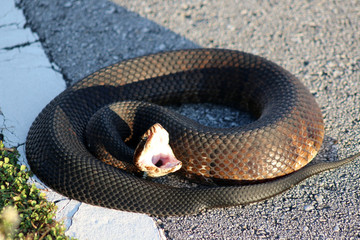ANIMAL: Northern Cottonmouth Agkistrodon piscivorus Type of Animal: Viper Habitat: Freshwater/brackish water: swamps, marshes, ditches, ponds, edges/shores of ponds/lakes/streams, streams, rivers, creeks, lakes, wetlands, coastal plains, floodplains, wet fields, rice fields, riparian zones, ponds/streams in offshore keys, brackish tidal estuaries, mountain streams, bayheads, sloughs, canals, & bayous. Sometimes found in saltwater areas in marshes & offshore keys. Hibernate/bask in land areas in upland areas, fields, agricultural areas near water, pine forests/woodlands, palmetto thickets, pine-palmetto forest, pine flatwoods, deciduous dune forest, dunes, beaches, riparian forest, & prairies. Location(s): Found in C & E Texas, E & S Oklahoma, extreme SE Kansas, S Missouri, Arkansas, Louisiana, Mississippi, Alabama, W & S Georgia, Florida, W Tennessee, W Kentucky, far S Illinois, far SW Indiana, much of S Carolina, E North Carolina, & far SE Virginia Appearance: Dark w/ heavy body, younger animals have red to brown crossbands & lighter brown, crossbands spotted/speckled, some adults completely black, adults usually black or dark brown but also come in light brown, gray, tan, or yellowish-olive becoming darker w/ age, tail tip starts yellow, becoming green/greenish-yellow turning black, underside of head whitish/cream/ tan, whitish belly, named for white mouth. Food/Diet: Fish up to size of catfish, bass, & pike, amphibians, young crocodilians, turtles, young tortoises, lizards, other snakes (including smaller members of own species & other venomous species), birds up to size of great egrets (great egrets sometimes eat the snakes), mammals up to size of rabbits & muskrats, carrion, eggs, snails, as well as caterpillars, cicadas, & other insects Status in Wild: Stable Conservation: Breeding in zoos & reptile centers Lifestyle: Solitary Additional Info: Called: Male Female Young-Snakelet Group-Solitary Weight: Male- 4 lbs Female- 3 lbs Gestation: 3-4 months Life Span: 20 years Body Length: Male- 4-5 ft Female- 3 ft Young- 1 ft Tail Length: 0.5-1 ft Main predators of adults are crocodilians, bobcats, coyotes, foxes, raptors, bears, snapping turtles, dogs, cats, raccoons, otters, opossums, feral pigs, large wading birds, cranes, shrikes, larger cottonmouths, kingsnakes, black racers, black ratsnakes, & largemouth bass (the latter 5 sometimes being eaten by cottonmouth in fights to death). Young preyed on by longnose gar & smaller egrets/herons. Gives birth to 1-20 live young every 2-3 years. Fun Fact(s): Many nonvenomous water snakes mistaken for them & killed. They have hemotoxic venom. These snakes not as aggressive as people say & retreat if given chance.
